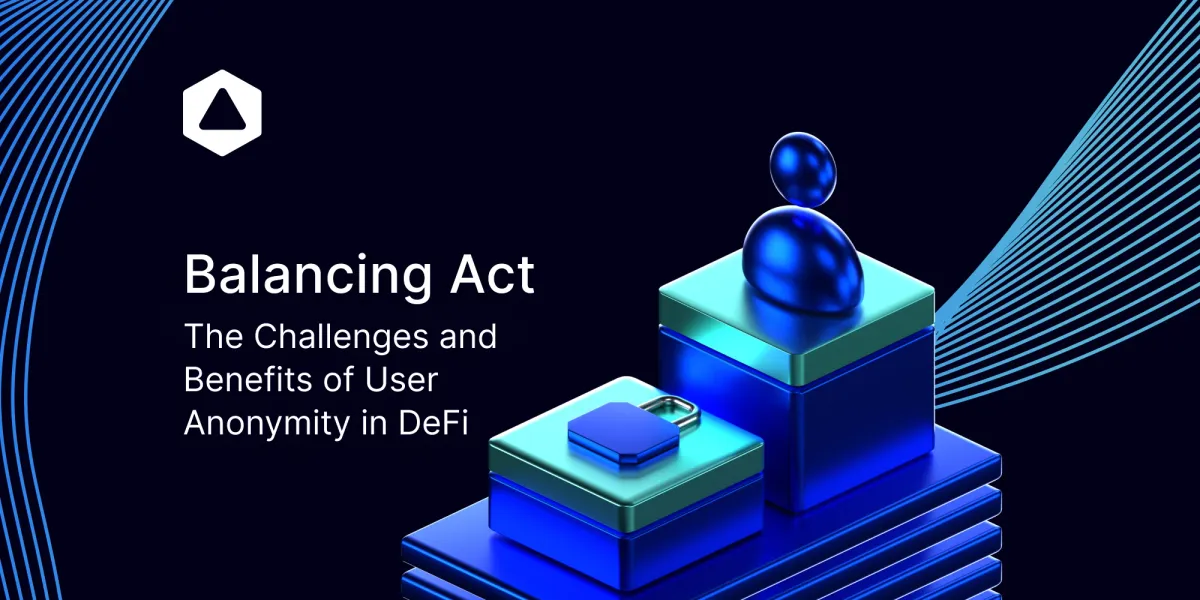Balancing Act: The Challenges and Benefits of User Anonymity in DeFi

Decentralized Finance (DeFi) stands to revolutionize the traditional financial landscape by offering a borderless and permissionless ecosystem where everyone is treated fairly. At the core of DeFi lies the pivotal concept of user anonymity, echoing the cypherpunk ethos of privacy and freedom on which the early Bitcoin community was founded on. With its roots deeply imbedded in the ideals of privacy, security, and personal autonomy, DeFi enables individuals to conduct financial activities without revealing their identities. While this commitment to anonymity offers profound benefits, it also raises complex challenges that demand thoughtful exploration.
The Challenges of User Anonymity in DeFi
Regulatory Concerns:
While anonymity is a cornerstone of DeFi, it often clashes with the traditional frameworks set by private financial institutions and governments alike. Striking a balance between adhering to regulations and maintaining user anonymity can be complex for everyone involved, from the developers of privacy-minded dApps, users, to the investors. What's happening with Tornado Cash (a cryptocurrency mixer that anonymizes transactions) is an unfortunate example of how difficult it can be to navigate DeFi with regulatory uncertainty looming overhead.
There are a myriad of issues that stem from regulatory uncertainty: Tornado Cash's lead devs are facing potential jail time, partly due to their encouragement of individuals to anonymize themselves. Last year's OFAC sanction against Tornado Cash prohibited all U.S. citizens from using the mixer's service, leaving many to wonder what will happen to their assets if they unknowingly receive "tainted" crypto then try to offramp fund on a centralized service--will their accounts be flagged or worse, frozen, with their money irretrievable in the future?
Mainstream Adoption Hurdles:
Since DeFi transactions are pseudonymous, it becomes difficult to trace fraudulent or malicious activities back to specific individuals. Although the dream for many crypto enthusiasts is to onboard all people to DeFi, the lack of customer support and risks associated to self custody can be challenging for those accustomed to tradional financial services. The comparative difficulty in addressing disputes, reversing transactions, and tackling fraud can hinder user confidence, thus curtailing mass adoption of DeFi products.
Lack of Accountability:
Anonymity, while it offers many advantages, can be a double-edged sword. Anonymity can provide cover for bad actors to engage in fraudulent schemes, some of which may be highly unethical as well as illegal. Without proper mechanisms for accountability, the DeFi space could become a breeding ground for activities that harm innocent participants. While the sales of illicit materials, drug or even human trafficking, and hired guns may seem like activities that belong realm of fiction for the average DeFi user, it's naive to think that bad things don't occur deep within cyberspace, under the cover of digital anonymity, just as they do in the physical world.
The Benefits of User Anonymity in DeFi
While there are certainly many concerns to weigh when considering user anonymity, there is overwhelming good and a need for anonymity on a global scale.
Freedom from Oppressive Regimes:
In numerous countries around the world, citizens have fallen victim to oppressive regimes that monitor and control their financial activities. User anonymity in DeFi would empower individuals in such regimes to maintain control over their assets without fear of government surveillance. For instance, during the Arab Spring uprisings in 2010-2011, crypto-savvy citizens of countries like Egypt and Tunisia used digital platforms to transfer and protect their assets from confiscation, highlighting the vital role of anonymity in times of political upheaval.
Financial Discrimination:
Traditional financial systems often discriminate based on nationality, credit history, and economic status. In the early days of Bitcoin, a significant portion of the user base emerged from countries facing economic crises or hyperinflation. These users found refuge in Bitcoin's anonymity, enabling them to transact globally without being subjected to discriminatory practices that often cripple their financial opportunities.
User anonymity in DeFi isn't just a concept; it's a lifeline for the unbanked, like those trapped by rigid social strictures, such as the Dalit caste in India. Discrimination against the Dalits (so maligned that they're also referred to as "Untouchables") has led to financial exclusion, making traditional banking systems off-limits. DeFi offers these marginalized communities the opportunity to access financial services without revealing their identities, creating avenues for economic empowerment and breaking the chains of financial oppression.
Whistleblower Protection:
Edward Snowden's revelations in 2013 about mass surveillance by government agencies highlighted the need for secure communication channels and financial anonymity. Whistleblowers seeking to expose wrongdoing can rely on anonymous cryptocurrency transactions to safely receive donations and support while protecting their identities from powerful entities that may seek retaliation.
Striking a Responsible Balance
Balancing the benefits and challenges of user anonymity in DeFi demands nuanced solutions. Educating users, thought leaders within DeFi working with regulators to develop frameworks that align with privacy ideals (such as DeFi services that maintain the transparency of transactions while preserving user anonymity, like anonymous reputation systems), and the larger community pushing for social/economic support of developers who focus on financial inclusivity while guarding against the misuse of user anonymity, are some of the paths we can take to create an environment that upholds the principles of self sovereignty that sparked the inception of cryptocurrencies.

Connect with Bitfinity Network
Bitfinity Wallet | Bitfinity Network | Twitter | Telegram | Discord | Github

*Disclaimer: While every effort is made on this website to provide accurate information, any opinions expressed or information disseminated do not necessarily reflect the views of Bitfinity itself.


Comments ()